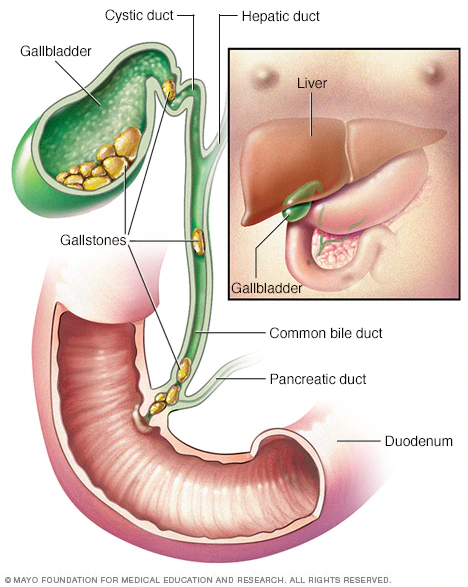Share

GALLSTONES
By Victoria Healthcare 12 April 2019

What is the gallbladder? — The gallbladder is a small, hollow, pear-shaped organ that is tucked under your liver (figure 1). It stores bile, a fluid that helps the body break down fat.
Normally, the gallbladder fills with bile in between meals. Then, when you eat fatty foods, the gallbladder squirts the bile into the intestine to better digest the fat. Sometimes, though, gallstones clog the gallbladder and keep it from draining. Other times, gallstones just irritate the gallbladder. If the gallstones are pushed out of the gallbladder, they can keep the liver or pancreas from draining.
What are gallstones? — Gallstones are small stones that form inside the gallbladder. They can be tiny specks or get as big as the whole gallbladder, which can be up to 6 inches long.
What are the symptoms of gallstones? — In most cases, gallstones do not cause any symptoms. When they do cause symptoms, gallstones can cause:
- Belly pain – Often on the right side just under the rib cage or in the middle top portion of the belly
- Pain in the back or right shoulder
- Nausea and vomiting
If you know that you have gallstones but have no symptoms, you probably will not need treatment. But if you start having symptoms, you should get treated before it becomes more complicated or a serious surgical emergency. The symptoms can come and go, but they often get worse over time.
Are gallstones serious? — Not usually. In rare cases they can lead to serious problems, including:
- Plugging up the main duct from the liver to the intestine. This causes life-threatening infection. Jaundice, a symptomthat turns your skin and eye-whites yellow is nearly always seen with this.
- Serious and life-threatening infection
- Tears in the gallbladder, which can lead to death if not treated as an emergency.
- Serious inflammation of the pancreas (the pancreas is an organ that makes hormones and juices involved in food breakdown).
Is there a test for gallstones? — Yes, doctors can find out if you have gallstones by doing an ultrasound imaging test. An ultrasound is painless and can create a picture of your gallbladder and the ducts from the liver, plus the liver itself.
Even if tests show that you have gallstones, that does not mean they are causing symptoms. Your doctor might need to do other tests to make sure your stones and your symptoms are related. In some cases, there are no gallstones, but the gallbladder causes pain by not emptying properly. This can also be tested.
How are gallstones treated? — People with gallstones generally have 3 treatment options. They can have:
- No treatment – This option is best for people with no symptoms. If they start having symptoms, then they can think about treatment.
- Surgery to remove the gallbladder and the stones – Gallbladder surgery is routine, being one of the most common operations. It is performed by a “minimally invasive” technique: laparoscopy. In laparoscopy, small nicks in the skin are made to insert a camera and very thin instruments. The surgeon then performs the operation by watching the HD screen and the tiny instruments, rather than actuallyh putting his/her hands in through a larger incision. General anesthesia is used, so there is no pain during the procedure.
The surgery does not affect digestion very much and symptoms are usually eliminated nearly completely. But about 1-8 in 100 people who have this surgery have mild symptoms afterward, including watery bowel movements, gas, or bloating. These symptoms usually get better over time. People who have their gallbladder removed do not need to worry about gallstones coming back.
- Treatment to get rid of the stones but keep the gallbladder – People who choose this approach can take medicines to break up gallstones or be treated with a device that uses sound waves to break up the stones (or both). These treatments can work, but they take time – months to years. People with severe symptoms might not want to wait that long to get relief. Plus, the stones can come back after these treatments.
How do I know which treatment to have? — The right treatment for you will depend on:
- How large your stones are
- Whether you have symptoms, and how bad the symptoms are
- How you feel about the treatment options
Ask your doctor or nurse how each treatment might affect you. Then work with him or her to find the treatment that makes the most sense for you.
Can I do anything to keep from getting (more) gallstones? — Yes. You can try to keep yourself at a healthy weight. People who are overweight are more likely to get gallstones. A diet with high fiber and moderate fat is helpful, too.
If you plan to lose weight quickly – even if you have never had gallstones – consultyour doctor or nurse. Sometimes extremely rapid weight loss through very severe diets can increase your risk of gallstones. Losing weight quickly through weight loss surgery can also lead to gallstones. But your doctor or nurse can give you medicines that can lessen this risk.
Source: Uptodate.com


